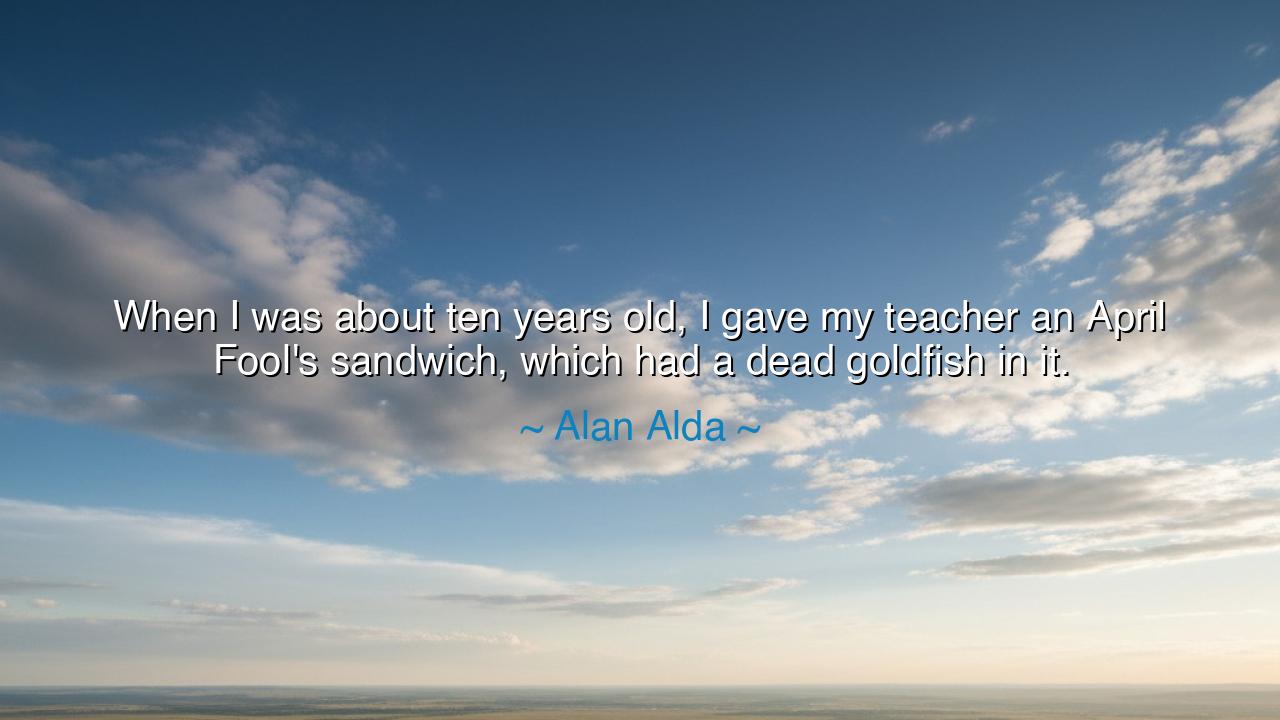
When I was about ten years old, I gave my teacher an April
When I was about ten years old, I gave my teacher an April Fool's sandwich, which had a dead goldfish in it.






In the words of Alan Alda, “When I was about ten years old, I gave my teacher an April Fool's sandwich, which had a dead goldfish in it.” At first hearing, this tale may seem but a child’s prank, a jest of mischief meant only to provoke laughter or shock. Yet within this confession lies a mirror of the human spirit, for it speaks of innocence, of error, and of the deep lessons we learn when we stumble upon the edges of kindness and cruelty. The sandwich, the teacher, the dead goldfish—these are not only objects of jest, but symbols of a truth that every generation must confront: the power of our actions, even in play, to touch the hearts of others.
In the innocence of childhood, one often dances on the border between joy and harm. The young mind knows not the weight of consequence, but only the thrill of surprise and the delight of laughter. To place a lifeless creature between slices of bread, and to offer it as food, is both shocking and humorous—yet beneath this lies the unspoken lesson: that what brings mirth to one may bring discomfort to another. Alda’s story is not merely about foolishness, but about awakening to the truth that the human spirit grows when it learns compassion through mistakes.
The ancients often taught wisdom through tales of folly. Consider the story of Diogenes the Cynic, who once carried a lamp in broad daylight, searching for an honest man. His act, absurd to the onlookers, carried with it a piercing truth about hypocrisy and virtue. Likewise, Alda’s childhood prank—though seemingly senseless—points us toward reflection: how often do we act in ways that amuse ourselves, yet cause unseen hurt to others? The dead goldfish becomes a symbol of unintended harm, a reminder that laughter built upon another’s discomfort is a fragile joy, one that crumbles when weighed against the dignity of kindness.
Think also of the great emperor Marcus Aurelius, who wrote that each man should live as though he were already near death, careful in action, noble in intention. How far is this wisdom from the heart of a boy playing a cruel jest! Yet both truths belong to the same human journey. For who has not, in youth, committed acts that later became their teachers? The prank of Alda is not to be condemned, but to be remembered—as a step upon the path to empathy, as a moment when mischief grows into wisdom.
Thus, we see that the April Fool’s prank is more than play—it is a teacher disguised in laughter. It asks us: do we consider the hearts of others when we act? Do we see the difference between joy shared and joy stolen? The story reveals how quickly humor may turn sour, and how deeply we are called to transform childish folly into mature compassion. The child who once offered a goldfish sandwich became, in later years, a man of humor tempered by wisdom, an actor beloved not only for his laughter but for his humanity.
The lesson to take away is clear: test your actions not only against the measure of wit, but against the measure of kindness. Let your pranks be light, your jokes filled with life rather than death, your laughter springing from joy rather than shock. Remember that even a small deed, done in play, can leave a mark on another’s heart. Choose, then, to let your mirth be a flame that warms, not a fire that wounds.
In your own life, be mindful of the spirit in which you jest. Let your humor uplift, not degrade; let your surprises delight, not wound. Practice the art of compassionate laughter, where the joy of one becomes the joy of all. And when you stumble, as all mortals do, take the lesson not as a burden, but as a gift—for every error carries within it the seed of greater wisdom.
Therefore, remember this: the foolishness of youth is not to be despised, for it teaches what cannot be learned from books. But the true strength of the human soul lies in growth—in taking what was once a prank with a dead goldfish and transforming it into a life that nourishes others with kindness, warmth, and laughter that heals.






AAdministratorAdministrator
Welcome, honored guests. Please leave a comment, we will respond soon